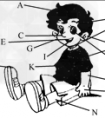根据句意、首字母或英语提示完成句中所缺的英语单词。1. Lucy and Lily are twins, so they are s____________ in many ways.2. My computer is broken. He is r_______-九年级英语
21.return to China=come back to China 返回中国
22.teach English at a famous medical college 在一所著名的医科大学教英语
23.tall and healthy 个高又健康
24.short and slim 个矮又苗条
25.be clever and quick in doing things 在做事上聪明伶俐
26.come here to learn singing 来这儿学唱歌
27.tell sb.a funny story 给某人讲述有趣的故事
28.on foot 步行
a)on one’s way to school 在上学的路上
b)on one’s way home 在回家的路上
c)on one’s way to the hospital 在去医院的路上
d)on one’s way to the cinema 在去电影院的路上
e)on one’s way to see a film 在去看电影的路上
29.see sb. do sth. 看见某人做某莫事 see sb.doing sth.看见某人正在做某事
a)hear sb. do sth 听到某人做某事 hear sb. doing sth.听到某人正在做某事
b)make sb.do sth 迫使某人做某事 help sb. (to) do sth.帮助某人做某事
c)1et sb.do sth.让某人做某事 had better do sth.最好做某事
30. fall to the ground 倒在地上
31.go over 走过去,复习功课
32. hurry to school 勿忙去上学
33.be late for the first class 第一节课迟到
34.say with a smile 微笑地说
35.be glad to do sth.高兴做某事
36.do a good thing (deed) 做一件好事
37.fall ill=be i11 生病,患病
38.take sb. to a hospital 把某人送到医院
39.rain heavily 下大雨
40.on the road 在公路上
41.not know what to do 不知道该做什么
42.just then 正在那时
43.come up 走进,上来
44.in front of 在……前面
45.thank sb. again and again 反复感谢某人
46.drive away (汽车)离开
run away 跑开
take away 拿走
47.right away 立刻
48.right now 此刻,刚才,现在
49.get home 到家 get there 到达哪儿 get here 到达这儿
50. yesterday morning 昨天晚上
51.leave the hospital 离开医院
52.no buses=not any buses 没有车
53.say to sb.对某人说 say to oneself 自言自语
54.fall off 跌落
55.need to get up early 需要早起床
56.hurt my arm 胳膊受伤
57.What's wrong with you?=What's the matter with you? 你怎么了?
58.do one's homework on the computer 在电脑上做作业
59.have four English lessons 上四节英语课
60.once a week 一周一次 twice a year 一年两次 three times a month 一个月三次
61.do more listening and speaking 做大量的听说练习
do some cleaning 扫除
do some washing 洗衣服
do some shopping 购物
62.make good progress in English 在英语方面取得很大进步
63.help a lot in our studies 在学习上给子很大帮助
64.teach sb. English 教某人英语
65.get to school 到达学校
66.give sb.lessons 给某人上课
67.ask sb.to do sth.要求某人做某事
ask sb.not to do sth.要求某人不要做某事
68.let sb. do sth.让某人做某事
1et sb. not do sth.让某人不要做某事
69.not……until 直到……才
70.make one's lessons interesting 使某人的课上的很有趣
71.tell sb. how to do sth.告诉某人怎样做某事
72.try to learn new things be oneself 设法靠自己学一些新的知识
73.want to be a history teacher 想成为一名历史老师
74.grow up 长大
75.in future 在将来
76.computer room (电脑)机房
77.language lab 语言室
78.finish middle school 中学毕业
79.want to become (be) a designer 想成为一名设计家
80.wish to be doctor 希望成为一名医生
81.an American boy 一个美国男孩儿
82.study in a high school 在高中学习
83.in Grade Eight 在八年级
84.finish primary school 小学毕业
85.start school at the age of seven
=begin to school when I was seven 七岁开始上学
86.move to Washington with his family 和他全家搬到华盛顿
87.be interested in 对……感兴趣
88.want to become a doctor of Chinese medicine 想成为一名中医
89.come here to learn Chinese 来这儿学习中文
90.a nice school 一所好的学校
91.instead of 代替
92.in many ways 在许多方面
93.be different from 与……不同
94.by the way 顺便说
95.come back home 回家
96.be sorry for 为…难过,遗憾
97.feel sorry for 为…难过,遗憾
98.burn away 燃烧没了
99.open the door 开门
100.take sb. in one's arms 拥抱某人
101.have some medicine 吃药
102.have a football match 进行一场足球比赛
103.have a meeting 开会
104.walk back 向后走
105.give sth. back to sb. 把某物还给某人
106. work through the night 通宵工作
107.get through the examinations=pass the exam 通过考试
108.happen to 发生
l09.knock at the door 敲门
110.want to do sth. 想做…
111.fall down 掉下来
112.begin to do sth. 开始做…
113.have some tea 喝茶
114.have sports 进行体育锻炼
115.have a bad coId 得了重感冒
116.have a good time 玩的很高兴
117.keep back 向后退
118.so…that 如此…以至于…
考点名称:名词
- 名词:
是词性的一种,也是实词的一种,是指待人、物、事、时、地、情感、概念等实体或抽象事物的词。
名词可以独立成句。在短语或句子中通常可以用代词来替代。 名词分类:
一、按意义分类
1.专有名词
表示具体的人,事物,地点,团体或机构的专有名称(第一个字母要大写)。
例:China(中国)、Asia(亚洲) Beijing(北京)、the People’s Republic of China(中华人民共和国)。
专有名词如果是含有普通名词的短语,则必须使用定冠词the。
如:the Great Wall(长城)。
姓氏名如果采用复数形式,则表示该姓氏一家人(复数含义)。
如:the Greens( 格林一家人)。
2.普通名词
表示某些人,某类事物,某种物质或抽象概念的名称。
例如:teacher 老师、tea 茶、 reform 改革。
普通名词又可进一步分为五类:
①个体名词(Individual Nouns):表示单个的人和事物。
(car 汽车 room 房间 fan 风扇photo 照片)
②集体名词(Collective Nouns):表示一群人或一些事物的名称。
( people 人们 family 家庭 army 军队 government政府 group 集团 )
③复合名词:两个或两个以上名词连在一起构成的名词
(boy-friend男友 passer-by过路人 brother-in-law内兄)
④物质名词(Material Nouns):表示物质或不具备确定形状和大小的个体的物质。
( fire 火 steel 钢 air 空气 water 水 milk牛奶 )
⑤抽象名词(Abstract Nouns):表示动作,状态,品质或其他抽象概念。
( labour 劳动 health 健康 life 生活 friendship友情 patience耐力 )
二、按是否可数分类
名词又可分为可数名词(Countable Nouns)和不可数名词(Uncountable Nouns)
1、不可数名词是指不能以数目来计算,不可以分成个体的概念、状态、品质、感情或表示物质材料的东西;
它一般没有复数形式,只有单数形式,它的前面不能用不定冠词a / an。抽象名词,物质名词和专有名词一般是不可数名词
2、可数名词是指能以数目来计算,可以分成个体的人或东西;因此它有复数形式。名词易混点举例:
一.有些名词既是可数名词,又是不可数名词,但意义有所不同。如:
work(工作) ——a work (著作);
glass(玻璃)——a glass (玻璃杯);
aper(纸) ——a paper(报纸;文件;试卷)
tea(茶) ——a tea (一种茶)(表示种类);
wood(木头) ——a wood (小树林);
room(空间) ——a room (房间)
二.容易混淆的名词
1.work/job
① work是不可数名词,有体力或脑力劳动的意思,又有作为职业概念的“工作”的意思。
② job作为“工作”解,其实有两层含义:一个是“干活”的“活”或“零工”;一个作为职业的“事”,是可数名词。
- 最新内容
- 相关内容
- 网友推荐
- 图文推荐
| [家长教育] 孩子为什么会和父母感情疏离? (2019-07-14) |
| [教师分享] 给远方姐姐的一封信 (2018-11-07) |
| [教师分享] 伸缩门 (2018-11-07) |
| [教师分享] 回家乡 (2018-11-07) |
| [教师分享] 是风味也是人间 (2018-11-07) |
| [教师分享] 一句格言的启示 (2018-11-07) |
| [教师分享] 无规矩不成方圆 (2018-11-07) |
| [教师分享] 第十届全国教育名家论坛有感(二) (2018-11-07) |
| [教师分享] 贪玩的小狗 (2018-11-07) |
| [教师分享] 未命名文章 (2018-11-07) |






